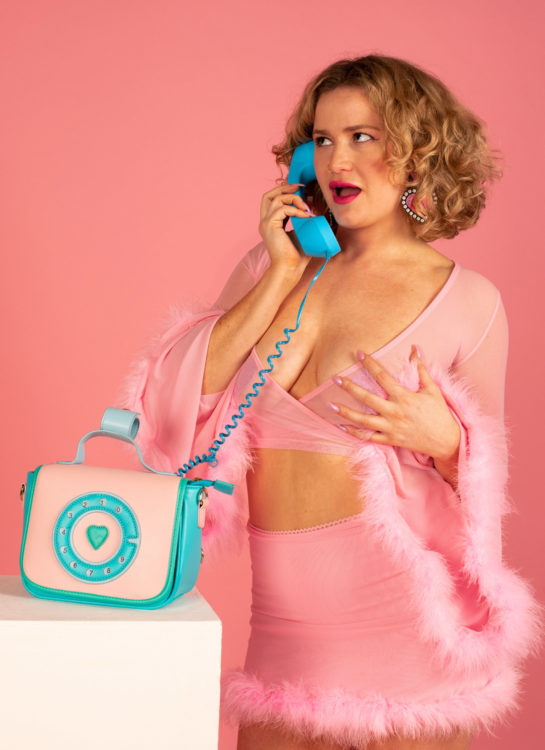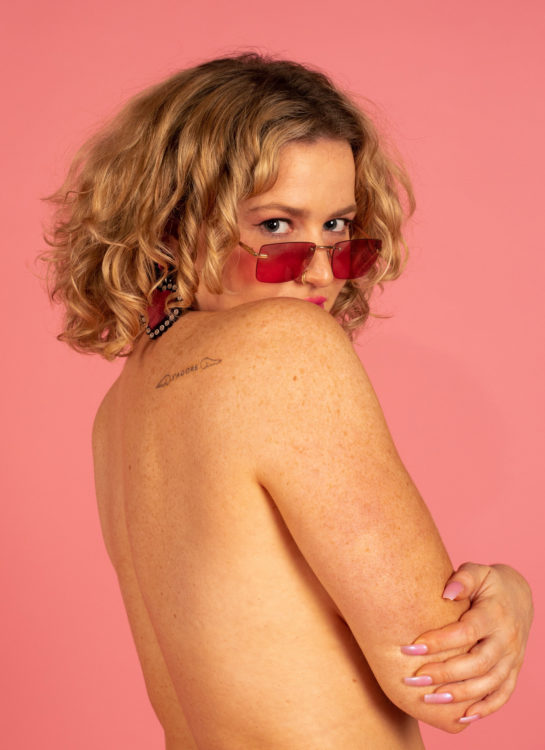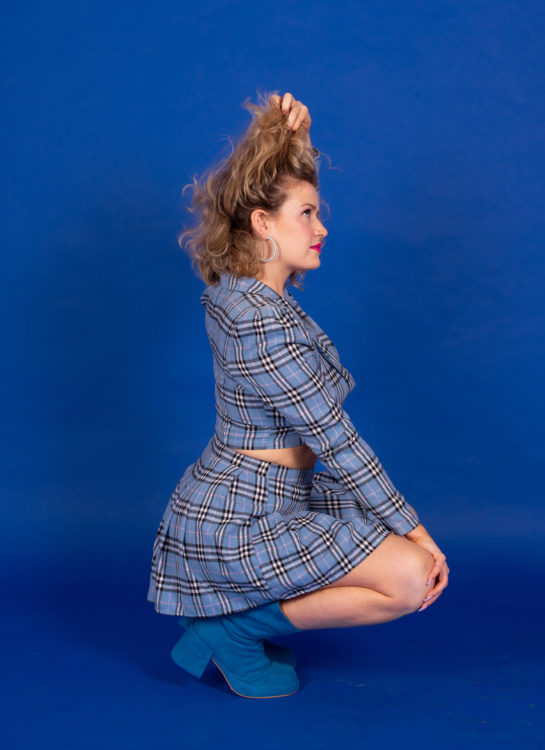- Words Aimee Phillips
- Photographer Sarah Harry-Isaacs
The comedian and author on how she got into stand up, her upcoming UK tour, ‘A Show About Me(n)’, the pressures of social media, and her biggest icks.
Just give Grace Campbell her own TV show already. Bubbling with acuity, her shamelessness and self-reflection are catching, rapidly gaining the comedian a cult following.
Grace’s first show at the Edinburgh Fringe, ‘Why I’ll Never Be In Politics’, was a smash in 2019. After two years away (pandemic, obvs), Grace made her return this summer with ‘A Show About Me(n)’, a wildly funny and brutally honest satirical piece about her relationship with men and herself. It’s a modern take on love, relationships, sex, and how people perceive her. A sold-out success at the Fringe, Grace is set to take the show on her biggest UK tour to date in February and March 2023, including a night at the legendary Alexandra Palace. The homecoming show feels particularly fitting for the star who self-describes as ‘Very famous in North West London’.
Reclaiming shame, particularly around sex, is a topic Grace has discussed throughout much of her work. While it is a recurring theme throughout her stand-up routines, Grace first positioned herself as a thought leader on shame reclamation and liberation in her witty memoir, Amazing Disgrace: A Book About “Shame”. In it, Grace recounts her life experiences, opening up about mental health, friendships, sex and more through her refreshing comedic lens, ultimately learning to become proud of who she is and embrace the lessons that life has taught her.
Alongside her standup and writing, Grace has also built a name for herself as a satirical commentator on everything from politics to pop culture through sketches on social media. Whether she’s wisecracking about Matt Hancock’s career trajectory or playing a range of characters such as a ‘Tory girlboss’, Grace manages to nail the line between humour and raising awareness around current socio-political issues. She also often teams up with her father, Alistair Campbell (best known as Tony Blair’s ‘spin doctor’) on hilarious video content, and the pair even had a podcast together: Football, Feminism & Everything in Between.
We sat down with Grace to hear about some of her favourite on-stage moments from the Fringe, opening up the world of comedy to more women, the demands of social media, her biggest icks, and what she wants her legacy to be.


J’adore your comedy. How did you start doing stand up?
Stand up was quite accidental. I always wanted to be a performer and I always wanted to write, but I didn’t really grow up in a family that watched much stand up; I’d never been to a gig until I started doing stand up. It was just a world that I didn’t really know that much about. I was relatively young, I started when I was like, 23. I was doing it to try and get better at writing, and then it was accidental, how much I actually loved it. Live comedy is the thing that brings me the most amount of joy in my life, because it’s just so rewarding and so much fun. Being around people is just better than not being around people.
You run your own comedy night, Disgraceful Club. I went to one earlier this year at Bush Hall and it was great. How do you select which comedians to join you on the line-up?
It varies. It’s a way for me to meet the people that I love. I’ve become friends with some of my favourite stand ups by getting them to do the Disgraceful Club and getting them to come and then becoming friends with them. So often it’s people that I admire or people I have gigs with, and then some newbies, people who message me and say, I’m new to stand up, I want to give it a try. I’ve done that quite a lot where someone will do one of their first sets at the Disgraceful Club. I say, can you voice note me your set before just so I can give you any feedback, which I love doing. What I quite like about doing it is sometimes I don’t know what the acts are gonna be like. There are some that I’ve seen before and then there are those where I don’t know how the crowd is gonna perceive them, and that’s really fun. It just makes it a bit more exciting. I did the Edinburgh Fringe in 2019 and I did it this year in 2022 and I had so many more friends this year, because of the Disgraceful Club, because I’ve met people through that. It’s just a nice way to meet people.
It seemed like you had an incredible time at the Edinburgh Fringe Festival this summer. How many times have you been?
I went once in 2018. I’d started doing stand up then but I did not know what the Edinburgh Fringe was. I got to Edinburgh and I was like, This is insane, it’s the entire city! And it’s so fun. I was like, this is like an entire world. So in 2018, I was like, I’ll definitely do it next year. It’s amazing, The Fringe, it’s flawed. It’s deeply flawed in terms of the way that artists get paid and how gruelling it is on people, not just artists but everyone, and I think there are things that can change about it, but it’s an incredible thing to do if you can – but that’s the thing, you kind of can’t unless you’ve got money.
You’re taking ‘A Show About Me(n)’ on a UK tour next February and March. Did you have the concept in mind when you started writing the material or was it realised naturally through work in progress material you would try out?
I started writing it at the beginning of this year, because I was going through so much in my love life; there was just so much material there. I had a backlog of material because I hadn’t done the Fringe for a few years due to Covid, but I’d gone through a huge break up and had all these rebound relationships. So when I started writing it as a show, I already had a lot of the material because of the last few years. I was in a bad place to be honest, and was like, I need to change something about my relationship with men, because I’ve got such an unhealthy dependence on male validation and I feel like I need to have a boyfriend all the time, which is really damaging, and was really distracting from everything else in my life. And really unhealthy. It was just really destroying my sense of self. So I had a break from men at the beginning of this year. That month off from dating was what made me want to write this show about me and men. In the silence when I wasn’t seeing anyone, I was like, Oh, this is maybe quite productive?
What reactions did you have from the audience when you performed it at The Fringe? It’s quite a personal show so did people come up to you after and say it resonated with them?
Beforehand, it would just be women in the queue, making friends with each other and talking about their love lives and then afterwards, they would all carry on talking about their love lives. If you’re a woman of our generation this stuff is incredibly relatable. I guess what I’m talking about, everyone in some way goes through, even if they’re not willing to admit it.
We’ve been so deeply conditioned in this world, tapped to thinking that men approving of us is the most valuable thing. And so even if it’s in a work capacity, or family, our relationships with our fathers, brothers – it’s in our system to think that men loving us is great, and that runs really deep. That’s what I’m talking about, because it’s why I kept getting into relationships which were really bad for me, because I just wanted to be loved. And I just wanted to know that I was sexual and know that men fancied me. I think that makes it really relatable. I love talking to the audience during shows because I love hearing about people’s breakups, and what’s going on. I’m just so inherently nosy. I love knowing what’s going on in people’s relationships.
Do you have a standout audience participation moment from the Fringe?
This year in Edinburgh, I’ve been spoilt for choice. I kept getting in trouble because my show would go over an hour because I’d lose track of time because I’d start talking to people and then just get lost in conversation.
There was this really sweet like older couple who I would say were in their 70s. They sat in the front row and they were called Belinda and Andrew. I obviously thought when I saw them when I came out, ‘Oh no, they’re gonna hate this, there’s so much sex’. I obviously presumed they’ve been together for a long time but Belinda was like, ‘It’s our year anniversary’, and they’d met a year ago on match.com and they were in their 70s. They were so in love with each other. There was this point where I talked about putting a Malteaser into my vagina and fanny farting it out and then Belinda turned to Andrew and was like, ‘we should try that’. It was amazing.


It must be such an amazing feeling, when you’ve connected with people. What’s it like when you come off stage?
It’s very intense. Edinburgh, and it will be the same with the tour, the chemicals that your body is running are insane. You’re nervous all day; I get so nervous before shows. And when I’m that nervous I’m like, Why do I do this? And I get on stage and I’m like, this is the best thing, hands down, in the whole world. Obviously, this is why I do this. But beforehand, I’m so nervous. And then you come off, and you’re just so elated. You have a few drinks, go to bed, and then you wake up the next day. And it’s the same roller coaster again.
Social media is such a crucial platform for comedians in showcasing their work and growing an audience. However, as appetite for new sketches and more posts grows – separate to the other work you’re doing like touring and writing new material – it must also create a lot of pressure, especially when political or topical social events happen and your fans expect you to have a reaction to it. What is your experience?
That is such a good question. Because you saying that is actually how I feel a lot of the time, but I don’t even consider it. There is such a pressure. I am first and foremost, a comedian and a stand up. My priority is that, but then because everything else makes that more successful, the more you do online, the more people that come to your shows. Commercially, I have been really successful for various reasons but the internet has a huge thing to do with that. And so you do feel this pressure, but it takes up a lot of your time. I’m like, ‘Oh, my God, I spent three hours making TikToks about Matt Hancock, and is it even going to do that well?’. Then you post it, and you’re like, has this been a waste of half of the day?
I couldn’t not mention your book, Amazing Disgrace: A Book About “Shame”, which came out two years ago now. Do you think you will write another book?
Yeah I definitely, definitely will. I actually love long form writing. I wrote that book in six weeks. It was really intense, because I got the book deal in lockdown and wanted it to come out in October. So I had to write it really quickly. I really did love it but it’s very draining. So I think I’ll definitely write another book when I want to dedicate loads of energy to it.
I’m loving your ‘icks’ series on Instagram Stories at the moment. What are some of your biggest icks?
I fear I’m getting the ick way too easily at the moment. I’m not really giving people enough of a chance and I fear I’ve participated in oversaturating the ick. I fear I’m part of the problem now because it happens too easily. I got the ick recently because somebody told me that he was going to see Joe Rogan live and I just stopped replying to him. It’s really bad because when people submit their icks, it’s almost like, people get the ick when men are too nice. Which is so toxic, and I know I’m part of that problem. But sometimes when men are just really nice and available I’m so icked by it, which is awful. It’s because I’ve these terrible traits of wanting someone to be a bit mean to me. That’s what I’m trying to work on at the moment. But ick is just overused in my life now, like I say ick when I drop something on the floor. It’s lost its meaning.
Lastly, looking to the future, what do you want your legacy to be?
I definitely want to do more outside of comedy around consent and the legislation [around consent]. Since I wrote the article in The Guardian, I’ve been finding out and hearing more and talking so much to people about their experiences. And it’s just so deeply disturbing and depressing. But I’m trying to figure out what I can do, because part of the problem with that kind of activism is that nothing changes. You feel like you are putting in so much emotional labour and not actually seeing tangible change.
Since my article in The Guardian came out, I know various people who have been raped in that time in the last three months. And so I want my legacy, if I ever have one, to be something around that. But I’m just really trying to figure out what I can actually do that’s helpful. I’ve got two other legacies. One is that I’ve taught so many men to be good in bed. That’s something that I’ve given to the world. There are so many men who give great head because I’ve told them how to do it. So they’re out in the world flourishing and other people are benefiting from my charitable work there. And then the other one is that I’ve helped lots of women get into comedy. I love introducing people to people. I really love bringing other people in. So if I can keep getting more women, young people in comedy and helping them with starting a platform, then that will be fun. I’ll feel good about that.
Grace Campbell is set to embark on her biggest UK tour to date from 21st Feb. Tickets available at www.disgracecampbell.com



